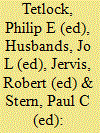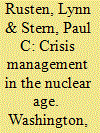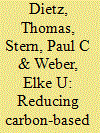| Srl | Item |
| 1 |
ID:
058828


|
|
|
|
|
| Publication |
New York, Oxford University Press, 1989.
|
| Description |
v.1(viii, 401p.)
|
| Standard Number |
0195057651
|
|
|
|
|
|
|
|
|
|
|
|
Copies: C:1/I:0,R:0,Q:0
Circulation
| Accession# | Call# | Current Location | Status | Policy | Location |
| 032253 | 355.027/TET 032253 | Main | On Shelf | General | |
|
|
|
|
| 2 |
ID:
034363


|
|
|
|
|
| Publication |
Washington, D C, National Academy Press, 1987.
|
| Description |
xi, 43p.
|
|
|
|
|
|
|
|
|
|
|
|
Copies: C:1/I:0,R:0,Q:0
Circulation
| Accession# | Call# | Current Location | Status | Policy | Location |
| 028829 | 327.16/RUS 028829 | Main | On Shelf | General | |
|
|
|
|
| 3 |
ID:
121034


|
|
|
|
|
| Publication |
2013.
|
| Summary/Abstract |
Actions by individuals and households to reduce carbon-based energy consumption have the potential to change the picture of U.S. energy consumption and carbon dioxide emissions in the near term. To tap this potential, however, energy policies and programs need to replace outmoded assumptions about what drives human behavior; they must integrate insights from the behavioral and social sciences with those from engineering and economics. This integrated approach has thus far only occasionally been implemented. This essay summarizes knowledge from the social sciences and from highly successful energy programs to show what the potential is and how it can be achieved.
|
|
|
|
|
|
|
|
|
|
|
|
|
|
|
|